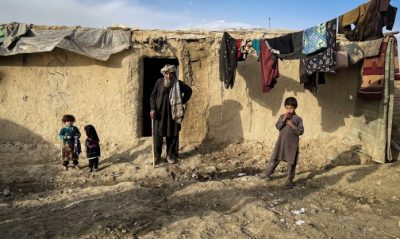The Top Five Conflict Variables in Afghanistan
There still remain several variables that could continue to destabilize the country in the coming future.

All Global Research articles can be read in 51 languages by activating the “Translate Website” drop down menu on the top banner of our home page (Desktop version).
Visit and follow us on Instagram at @crg_globalresearch.
***
The Taliban’s lightning-fast takeover of Afghanistan ended the most important phase of the country’s civil war but hasn’t yet concluded that conflict completely. There still remain several variables that could continue to destabilize the country in the coming future. These are:
1. The US & NATO Extending Their Withdrawal Beyond The September 11th Deadline
Western leaders are under pressure from their people not to fully withdraw from Afghanistan until all of their citizens and ideally also their local allies are safely evacuated, but extending the deadline beyond September 11th would risk provoking Taliban attacks.
2. The US & NATO Bombing The Taliban’s Seized Military Equipment
The withdrawing forces are very concerned about the Taliban’s seizure of Western military equipment including warplanes and tanks, and there are already some efforts being made within some of their countries to encourage their leaderships to bomb those assets after they withdraw from Afghanistan.
3. The “Panjshir Resistance” Continuing To Militarily Oppose The Taliban
Although its prospects of long-term success are practically nil, the so-called “Panjshir Resistance‘s” continued military opposition to the Taliban could possibly provoke a disproportionate response from the group that could in turn be exploited by some members of the international community to delegitimize their rule.
4. Armed Ethno-Religious Minorities Resisting The Taliban
Whether inspired by the “Panjshir Resistance” or whatever else, some other armed ethno-religious minorities elsewhere in the country might also eventually end up resisting the Taliban with time, which could perpetuate the civil war as well as worsen average Afghans’ suffering.
5. Deteriorating Socio-Economic Conditions Provoke Urban Unrest
The Taliban’s failure to respect minorities’ and women’s rights could provoke urban unrest among the people who re already distrustful of that group, as could deteriorating economic conditions brought about by the West’s attempts to isolate the Taliban in the event that they don’t eventually recognize its rule.
These five conflict variables can potentially be counteracted in the following ways:
1. Put International Pressure On The US & NATO To Withdraw By Their Deadline
The Taliban’s international partners like Russia and China (both of which still designate it as a terrorist group despite having pragmatic political and security relations with it) should make it clear that extending their withdrawal deadline will risk provoking another round of war and worsening the regional security situation.
2. Raise Global Awareness Of The Taliban’s Anti-Terrorist Credentials
Russia and China should also inform the international community of the Taliban’s genuine anti-terrorist credentials as the most formidable force against ISIS-K, which means that they require their seized Western military equipment in order to ensure regional stability and thus prevent another refugee crisis as well.
3. Russia & China Should Consider Mediating The Taliban-“Panjshir Resistance” Conflict
Russia and China should consider putting their diplomatic skills to use in mediating a political solution to this pressing issue in spite of Moscow’s earlier clarification that it doesn’t have any intent to do so since the “Panjshir Resistance’s” military defeat by the Taliban might delegitimize the latter’s rule.
4. Incorporate Regional Militias Into The New Afghan Security Forces
The Taliban must prioritize incorporating regional militias into the country’s new security structure together with resolutely rooting out the corruption that doomed its predecessor’s forces and eliminating the tendency towards warlordism in order to preempt the possibility of ethno-religious revolts.
5. Respect Promises & Court Foreign Investment
The Taliban must absolutely abide by its promise to respect minorities’ and women’s rights to ensure social stability while courting foreign investment from its regional partners in order to sustainably improve the economic situation by positioning Afghanistan as the crossroads of multipolar connectivity processes.
*
Note to readers: Please click the share buttons above or below. Follow us on Instagram, @crg_globalresearch. Forward this article to your email lists. Crosspost on your blog site, internet forums. etc.
This article was originally published on OneWorld.
Andrew Korybko is an American Moscow-based political analyst specializing in the relationship between the US strategy in Afro-Eurasia, China’s One Belt One Road global vision of New Silk Road connectivity, and Hybrid Warfare. He is a frequent contributor to Global Research.
Featured image: An Afghan man and children, suffering hardships from America’s longest war, pose for a portrait in Kabul, Afghanistan, on March 19, 2021. [Source: theintercept.com]
by Michel Chossudovsky
- ISBN Number: 9780973714715
- List Price: $24.95
- click here to order
Special Price: $18.00
In this new and expanded edition of Michel Chossudovsky’s 2002 best seller, the author blows away the smokescreen put up by the mainstream media, that 9/11 was an attack on America by “Islamic terrorists”. Through meticulous research, the author uncovers a military-intelligence ploy behind the September 11 attacks, and the cover-up and complicity of key members of the Bush Administration.
The expanded edition, which includes twelve new chapters focuses on the use of 9/11 as a pretext for the invasion and illegal occupation of Iraq, the militarisation of justice and law enforcement and the repeal of democracy.
According to Chossudovsky, the “war on terrorism” is a complete fabrication based on the illusion that one man, Osama bin Laden, outwitted the $40 billion-a-year American intelligence apparatus. The “war on terrorism” is a war of conquest. Globalisation is the final march to the “New World Order”, dominated by Wall Street and the U.S. military-industrial complex.
September 11, 2001 provides a justification for waging a war without borders. Washington’s agenda consists in extending the frontiers of the American Empire to facilitate complete U.S. corporate control, while installing within America the institutions of the Homeland Security State.

